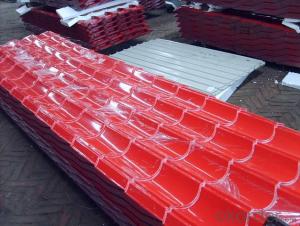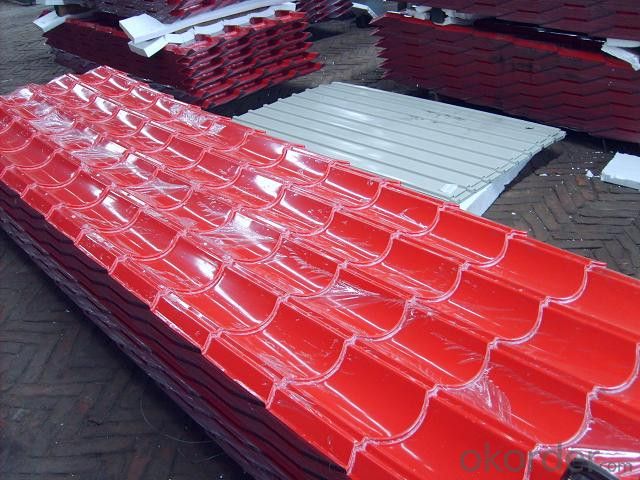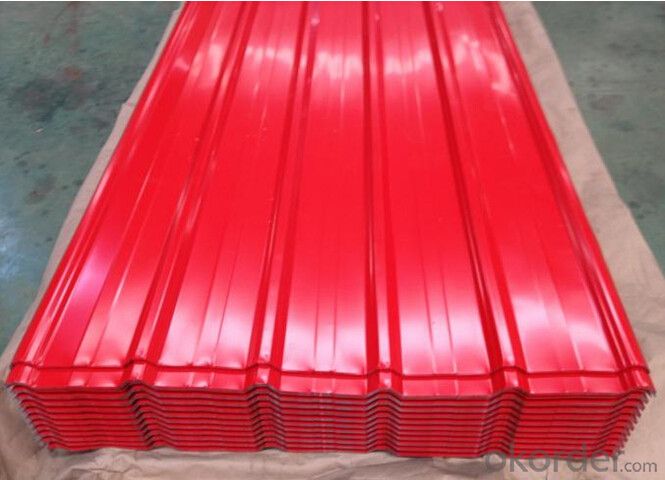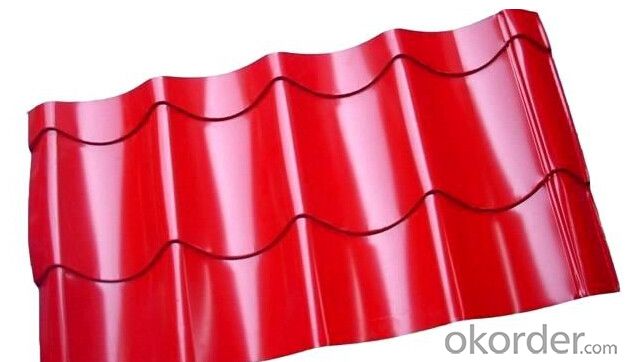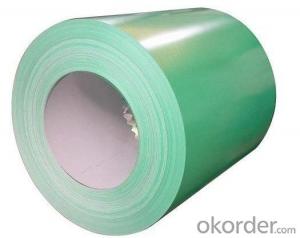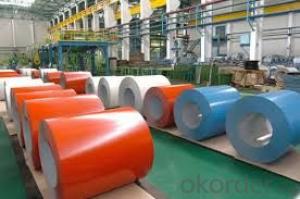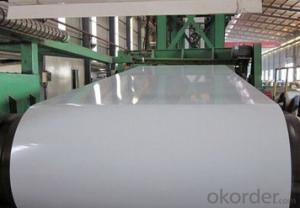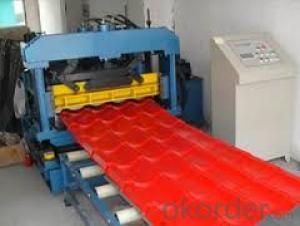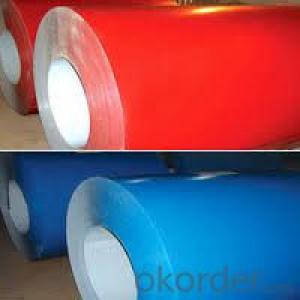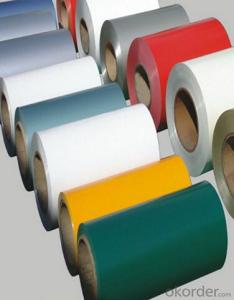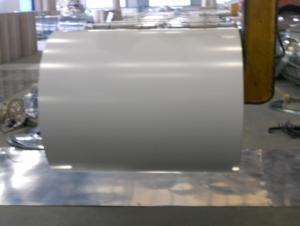prepainted Galvanized coils of Ppgi Coils
- Loading Port:
- Shanghai
- Payment Terms:
- TT OR LC
- Min Order Qty:
- 25 m.t.
- Supply Capability:
- 30000 m.t./month
OKorder Service Pledge
OKorder Financial Service
You Might Also Like
Properties
Our hot dip galvanised steels consist of a steel substrate with a metallic zinc coating applied by means of a continuous hot dip galvanising process. Metallic zinc coatings are available in steel grades ranging from steel for bending and deep drawing applications, to structural steels and high yield strength steels.
A glossy surface finish obtained under specific skin-pass conditions (either non-skin-passed or skin-passed with smooth cylinders to obtain low roughness) can be provided if required at time of enquiry.
Advantages
Hot dip galvanised products offer excellent corrosion resistance combined with very good forming properties. The coating process can apply very thick zinc layers, up to 725 g/m?(total of both sides).
Applications
Our hot dip galvanised steels can be used in a very wide range of applications for industrial markets, both indoors and outdoors. Some of the most common applications are:
Building: wide sections for roofing and cladding, doors, door frames, metallic ceilings, partitions, structural members etc
Domestic appliances: all appliances for this sector (both white and brown goods) are manufactured with hot dip galvanised steels
Miscellaneous: electrical cabinets, aeraulic components, air conditioners, road signs etc
Zinc hot dip galvanised steel is suitable for contact with foodstuffs under certain conditions, as specified in European directive 89/109/EEC and French standard NF A 36-712-1. Please contact us for further information on this subject.
1) AVAILABLE DESIGNATION OF hot dipped galvanized/galvalume steel coils
Quality | Q/BQB 440-2003 | JIS G3312-1994 JIS G3321 | EN 10326-2004 | ASTM A653-02a |
EN 10327-2004 | (BASE PLATE) | |||
(BASE PLATE) | ||||
Commercial Steel | DC51D | SGCC SGLCC | DX51D+Z DX51D+AZ | CS Type A/B/C |
Forming Steel | St01,St02,St03 | SGCD1 SGLCD1 | FS Type A, Type B | |
Drawing | DC52D /DC53D | - | DX52D+Z DX52D+AZ | DDS TYPE A/C |
Steel | DX53D+Z DX53D+AZ | |||
Structural | S280GD (StE28) | SGC400 SGLC400 | S280D+Z DX54D+AZ | SS275 |
Steel | S350GD (StE34) | SGC440 SGLC440 | S350D+Z S350D+AZ | SS340 Class1 |
2) Coated Mass OF HOT DIPPED galvanized/galvalume steel coils
zinc coat: 60gsm - 275gsm
Aluzinc coat: 60gsm - 150gsm
3) APPLICATION OF OUR HOT DIPPED galvanized/GALVALUME steel coils
Construction | Outside | Workshop, agricultural warehouse, residential precast unit, corrugated roof, roller shutter door, rainwater drainage pipe, retailer booth |
Inside | Door, doorcase, light steel roof structure, folding screen, elevator, stairway, vent gutter | |
Electrical appliance | Refrigerator, washer, switch cabinet, instrument cabinet, air conditioning, micro-wave oven, bread maker | |
Furniture | Central heating slice, lampshade, chifforobe, desk, bed, locker, bookshelf | |
Carrying trade | Exterior decoration of auto and train, clapboard, container, isolation lairage, isolation board | |
Others | Writing panel, garbage can, billboard, timekeeper, typewriter, instrument panel, weight sensor, photographic | |
- Q: What are the different types of steel coil surface treatments for corrosion resistance?
- There are several types of steel coil surface treatments for corrosion resistance, including galvanizing, zinc coating, chromating, and polymer coating.
- Q: How are steel coils used in the production of power transmission towers?
- Steel coils are used in the production of power transmission towers as they are rolled and formed into the required shapes and sizes to create the structural components of the towers. The coils are processed and cut into specific lengths, which are then welded or bolted together to construct the tower sections. The robustness and strength of steel make it an ideal material for transmitting large amounts of electricity over long distances, ensuring the stability and reliability of power transmission towers.
- Q: I'm looking for the weight of different types of steel and haven't found anything helpful!!thank you
- Just know the type of steel ,its density. Density gives you weight per unit of volume. For example: The density of mild steel is approximately 7.85 g/cm^3 (0.284 lb/in^3) From above , you can say that 1 cm^3 of volume of mild steel have 7.85 gram weight.
- Q: What are the different types of steel coil surface treatment options?
- There are several different types of steel coil surface treatment options available, each serving a specific purpose and providing various benefits. Some of the common surface treatment options include: 1. Hot-dip galvanizing: This process involves immersing the steel coil in a bath of molten zinc, which forms a protective zinc coating on the surface. Galvanizing provides excellent corrosion resistance and helps in extending the lifespan of the steel coil. 2. Electro-galvanizing: Similar to hot-dip galvanizing, but instead of immersing the coil in molten zinc, an electric current is used to deposit a thin layer of zinc onto the steel surface. Electro-galvanizing provides a smoother and thinner zinc coating, making it suitable for applications that require a more aesthetic finish. 3. Pre-painted or coated: Steel coils can be coated with a layer of paint or other protective coatings before they are formed into various products. This type of treatment provides additional protection against corrosion and enhances the aesthetic appearance of the steel coil. 4. Organic coating: Organic coatings are typically applied to steel coils to provide protection against corrosion and improve the overall durability of the product. These coatings can be in the form of epoxy, polyurethane, or other types of polymer-based materials. 5. Pickling: Pickling is a surface treatment process that involves removing impurities and scale from the steel coil by immersing it in an acid solution. This treatment helps in improving the adhesion of subsequent coatings and prepares the surface for further processing or finishing. 6. Oil coating: Steel coils can be coated with a thin layer of oil to protect the surface from oxidation and rust during storage or transportation. This coating is typically used as a temporary measure and is usually removed before further processing. 7. Shot blasting: Shot blasting involves propelling small metal particles at high velocity onto the steel coil surface. This process helps in removing rust, scale, and other contaminants, providing a clean and roughened surface for better adhesion of subsequent coatings. These are some of the commonly used steel coil surface treatment options. The choice of treatment depends on the specific requirements of the application, such as corrosion resistance, aesthetic appearance, or improved adhesion.
- Q: i have a computer chair where the metal part that attachs the top part to the bottom with wheels has cracked around half of the assembly. my dad said it might be able to be repaired with jb weld. can jb weld fix it? how strong is jb weld? is it as strong as steel?
- the stuff is pretty strong... i have a friend who blew a hole in his crankcase of his 07 cr450f and used jb weld on it... added oil and rode on it.. the stuff is crazy strong just give it a day to dry
- Q: What are the common industry standards for steel coils?
- The common industry standards for steel coils vary depending on the region and specific application. However, there are several widely recognized standards that are commonly used in the steel industry. One of the most commonly referenced standards for steel coils is the American Society for Testing and Materials (ASTM) standard. ASTM has developed a wide range of specifications for different types of steel coils, such as hot-rolled, cold-rolled, and galvanized coils. These specifications outline various mechanical and chemical properties that the steel must meet, as well as dimensions, tolerances, and testing requirements. In addition to ASTM, other international organizations such as the International Organization for Standardization (ISO) and the European Committee for Standardization (EN) have also established standards for steel coils. ISO standards, such as ISO 3574 and ISO 5952, provide guidelines for the general requirements, dimensional tolerances, and mechanical properties of steel coils. Similarly, EN standards, such as EN 10130 and EN 10131, specify the characteristics and tolerances for cold-rolled steel coils. Furthermore, industry-specific organizations and associations may have their own standards for steel coils. For example, the American Iron and Steel Institute (AISI) has developed specific standards for different types of steel products, including coils. These standards cover various aspects such as chemical composition, mechanical properties, and surface finish. It is important to note that steel coil standards can also be determined by the end-use application. Industries such as automotive, construction, and manufacturing may have specific requirements that go beyond the general standards. In such cases, customers and manufacturers may refer to industry-specific standards or work together to define custom specifications. Overall, while there are several common industry standards for steel coils, it is crucial to consult the specific standards and requirements applicable to the region and application in question to ensure compliance and quality.
- Q: What are the common applications of steel coils?
- Steel coils have a wide range of applications in various industries such as automotive, construction, manufacturing, and energy. They are commonly used for making components and parts in vehicles, buildings, appliances, and machinery. Steel coils can also be employed in the production of pipes, tubes, and electrical appliances. Additionally, they are utilized in the energy sector for manufacturing power transmission equipment and storage tanks.
- Q: Can steel coils be customized?
- Yes, steel coils can be customized according to specific requirements such as size, thickness, width, and even surface finish. Customization allows manufacturers to meet the unique needs of various industries and applications.
- Q: What are the different surface finishes available for steel coils?
- There are several different surface finishes available for steel coils, including hot rolled, cold rolled, galvanized, coated, and polished finishes.
- Q: How did the growth of the steel industry influence the development of other industries?
- At least three ways: 1. Steel as a material that other industries could use to do things that couldn't be done before (for example, construction (skyscrapers, long bridges, etc.)) or could now be done at much lower cost and hence increased the size of the industry (automobiles, bearings, etc.)
Send your message to us
prepainted Galvanized coils of Ppgi Coils
- Loading Port:
- Shanghai
- Payment Terms:
- TT OR LC
- Min Order Qty:
- 25 m.t.
- Supply Capability:
- 30000 m.t./month
OKorder Service Pledge
OKorder Financial Service
Similar products
Hot products
Hot Searches
Related keywords
